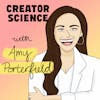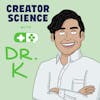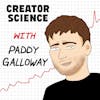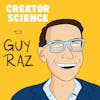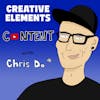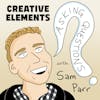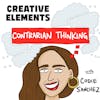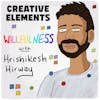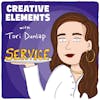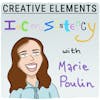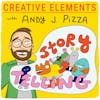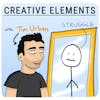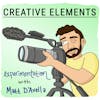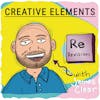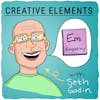
#71: Steph Smith – Generating thousands of sales on Gumroad (with a side project!)
Play EpisodeSteph Smith is a growth marketer, writer, and indie maker. She's the creator of two books, Doing Content Right and Doing Time Right.
Steph Smith is a growth marketer, writer, and indie maker. She's the creator of two books, Doing Content Right and Doing Time Right.
Doing Content Right is a 270-page book published in 2020. The book retails for $100 and has sold nearly 3200 copies on Gumroad.
Steph creates her independent work on the side while leading Trends for the Hustle, which generates millions in ARR and has 15000+ paying subscribers.
In this episode, we talk about how Stephanie found her way from chemical engineering into business, how she spends her time learning while also ensuring that she’s actively applying what she learns, her strategy for marketing and selling digital products, and why she believes we all have a TON of Agency to change our own lives and impact the world around us.
Learn more about Doing Content Right
Learn more about Doing Time Right
Full transcript and show notes
***
ABOUT JAY CLOUSE
Subscribe to my weekly newsletter
Enroll in my podcasting workshop
Enroll in my course on podcasting, Podcast Like The Pros
***
LISTENER SUPPORT
Join our community on Facebook
Support this show through Buy Me A Coffee
***
SPONSORS
Try Podia and save 15% for life as a Creative Elements listener
Start your free trial of SavvyCal and get your first month free using promo code ELEMENTS
Get a free month of Blinkist Premium
Try Grammarly for free and save 20% on Grammarly Premium
***
PODGLOMERATE NETWORK
This show is a part of the Podglomerate network, a company that produces, distributes, and monetizes podcasts. We encourage you to visit the website and sign up for our newsletter for more information about our shows, launches, and events. For more information on how The Podglomerate treats data, please see our Privacy Policy.
Since you're listening to Creative Elements, we'd like to suggest you also try other Podglomerate shows surrounding entrepreneurship, business, and careers like Rocketship.fm and Freelance to Founder.
Learn more about your ad choices. Visit megaphone.fm/adchoices
Steph Smith 0:00
The amazing part was that because people had bought it at such a cheap price, and so many people had bought it, that I just had this wave of basically like advocacy or free promotion of people being like, this is amazing. And truly, I think had I launched at $100, maybe I'd get like 50 pre-sales or something those people would feel good about the product, but they might not feel great about it.
Jay Clouse 0:20
Welcome to Creative Elements, a show where we talk to your favorite creators and learn what it takes to make a living from your art and creativity. I'm your host, Jay Clouse. Let's start the show.
Hello, my friend. Welcome back to another episode of Creative Elements. I hope you're having a great week. Thank you for bearing with me through last week's reairing of past episodes and thank you to everyone who did join the tweet 100 challenge. And if you're thinking what the heck is the tweet 100 challenge? Well, just go back and listen to the intro to last week's episodes and you'll be all caught up to speed. Speaking of Twitter, that is exactly where I met today's guest, her name is Steph Smith. And by day, she leads the trends community for the Hustle, a newsletter that was acquired by HubSpot in February of this year. But I know Steph from her independent projects that she shared over the years on Twitter where she has 33,000 followers. And in 2020, she published a 270 page ebook called Doing Content Right, which covers everything Steph knows about creating, writing and scaling blogs and newsletters to millions of readers. The book retails for $100 and has sold nearly 3,200 copies on Gumroad.
Steph Smith 1:49
I think a lot of people today will be like, oh, you have a Twitter following of x or you your book sold x and I'm I'm really like yes, that's true where I am, you know today in 2021. But I started creating things in 2018.
Jay Clouse 2:01
I'm always so impressed by people who don't necessarily have the biggest following but a ton of engagement with their work. Now, don't get me wrong, Steph has more than three times the number of followers that I do on Twitter so she's absolutely no slouch in the audience department. But what really impresses me is how those people embrace her and her projects. I mean, 3,200 sales of an ebook is really impressive. And as she just shared, that ebook came after several projects dating back to 2018.
Steph Smith 2:30
My blog is probably one of the first things that I started to release but it actually came after publishing a couple projects online, and that came from, I'd learned to code for a while. I happened to be living in Bali at the time and I'd seen several other creators think one of the most like well known ones is Pieter Levels. He was a friend of mine, I'd seen what he had built on his own and the freedom that he had, and really the life that he was living, how he could wake up working on his own projects decide what he wanted to work on, he was financially stable and I really wanted that. But I also recognize that, you know, I wouldn't get that overnight. So I continued to work in my job as I still do today, but just started to tinker away with projects. And in order to you know, get information about how you're doing as like a data driven person, you have to launch them. So I started launching a couple projects, getting feedback, people started following me to some degree.
Jay Clouse 3:18
Steph is underselling these projects a bit. These weren't just single page websites or publications, Steph was actually building web apps. And all of that happen because she had a goal to learn a new skill.
Steph Smith 3:30
Things really started when I learned to code so I spent that year most of it learning to code. I ended up watching four projects that year. They're just like little fun projects that, you know, they don't make any money. They're not super exciting but I publish those, I would launch them on Product Hunt. That was the year of I will say like learning to code and building things. Then at the very end of that year, or early into the next year is when I started writing for my blog. I did that for most of 2019, 2019 was also the year that I joined the Hustle later that year. And then 2020 is the year that I wrote my first book and now we're in 2021, I just launched a new project. So those are some of the I guess, key milestones.
Jay Clouse 4:09
The people who follow Stephanie online have had a front row seat to those milestones. And this is the great thing about building in public. When you follow someone's work, and they're sharing it all along the way, it almost feels like you get to participate in that same progress and success. But Steph says that wasn't really something she anticipated.
Steph Smith 4:27
It's been, I guess really surprising that people have started following me but I will say that, that has been a learning. Before that, I looked at a bunch of other people who I followed and was like, wow, like, they totally know what they're doing. There's such a big delta between me and where they are. And that's really interesting, as an unlock to be on the other side of that and be like wait, people are paying attention to what I'm doing. So it almost it not so much that it happened by accident, because it was intentional, but it wasn't intentional to be like I'm going to build a following here. It's like I just want to share these things and then you know, the rest came after.
Jay Clouse 5:01
So in this episode, we talk about how Stephanie found her way from chemical engineering into business, how she spends her time learning while also ensuring that she's actively applying what she learns, her strategy for marketing and selling digital products, and why she believes that we all have a ton of agency to change our own lives and impact the world around us. I'd love to hear your thoughts on this episode, as you listen, you can find me on Twitter or Instagram @jayclouse. Take a screenshot, tag me, say hello, I'll be happy to share it on my own story. And now, let's talk to Steph.
Steph Smith 5:40
I did my degree way back when, feels like yesterday in chemical engineering. And then actually, throughout that degree did a bunch of research. Every summer I was doing research in science and and technology, or more so engineering at the time. And at the time, if you haven't done a degree in chemical engineering, your paths are basically go work at an oil rig in some capacity, or perhaps like a chemical plant or something like that. And I was like, you know what, that does not sound like the life I want to live. So I ended up going a lot of engineers go into consulting. So I was in a classic business consulting role, did that for around a year. But I was also living a very, you know, classic, you've all heard this path where you're commuting two hours a day, going into an office, meeting with clients and, you know, that's your life. And so I navigated away from that within the year and joined a company, which was a tech company, it was called Toptal and was there for three years That was really my first foray into technology, worked on the growth team ended up leading their publications team. And then after that, I joined a company called The Hustle and that's the company that I, I guess, technically still work out, we got acquired, but just kind of a scattered path all the way into where I am now.
Jay Clouse 6:50
How did you make the first leap to Toptal? Because growth feels like something that like, I want the most experienced person in the world to come in.
Steph Smith 7:00
Yeah.
Jay Clouse 7:01
How did you prove yourself in and get that spot?
Steph Smith 7:03
Yeah, you know, it's so funny is that I found this out later. So at the time, I thought they hired me like, they must think I'm great. But what I found out later was that they were actually doing kind of an experiment where they had hired prior to that a bunch of people who were, as someone might say, experts in their respective spaces. So they had spent through between like 3 to 10 years in their space. And they were really good at their lane, or they knew a lot about but not great at thinking pass that and being explorative. And basically, when I joined Toptal, I think it was I don't know what it is today, but maybe 150 people or so at the time. And so they were still like scaling very, very quickly. And they needed someone who wasn't just an expert in one lane, but could expand pass that. And so I guess they had a couple stumbles in hiring those people. And they did a test with actually three of us. And they hired three people, one, myself from business consulting, one from banking, and one from I think she was a software developer so none of us had growth experience. But they just thought, who can we hire that we think is relatively smart, relatively good with a spreadsheet and can learn the rest and that that's what happened. And actually two of us, I guess, made it in the sense that we stayed with the company, one of those experiments didn't quite work out. But that's how I think I actually just got lucky to enter at the time when they were running that experiment,
Jay Clouse 8:21
Going from a chemical engineering background into business consulting and then into like, a dedicated business, we're not splitting your time across a bunch of clients, it seems like you had to pick up a lot about business pretty quickly. Did that happen through the consulting job more so? Or were you teaching yourself along the way? Like, how did you start to learn the ropes?
Steph Smith 8:41
It was a little bit of both so I definitely learned a lot in that business consulting role. So, I've written articles about how much I love spreadsheets, that's when I learned to love data and spreadsheets. I remember coming into that job in the first week and they told you see that mouse over there, we're going to teach you not to use it. And that's what they did, right? They taught you how to navigate a spreadsheet very, very quickly how to analyze data, how to, you know, design hypothesis and experiments. And that was where I learned a lot of the foundations in business, but I knew nothing as it related to marketing or growth, or a lot of the things that I know today. And I started to learn some of those, but mostly learned a lot of them at Toptal. But I started to learn some of those in the year when I was doing business consultingb ecause the reason I ended up joining Toptal was I was really, really sure that I wanted to work remotely. That was in 2015, I had heard about other people working remotely and I said I want that. But at the time, there was much fewer people working remotely so I started to learn a bunch of digital skills because I that was kind of the through line that I noticed I said if I want to remote role, these are the types of skills whether it was SEO, social media, you know, paid advertising. These are the skills that people are getting hired for unless they're a software developer, so I started to learn a bunch of those things on my own and do like random freelance gigs until I got hired at Toptal. But I will say that most of my learning and marketing ended up at at Toptal.
Jay Clouse 10:02
This is gonna sound like a weird question is chemical engineering more chemical or more engineering?
Steph Smith 10:08
It's funny because it's certainly both. But I think in terms of the way that people view those two subjects, it's more engineering. So in your later courses in chemical engineering, you're not so much talking about the like structure of a molecule. And you're more so, talking about how to size a pump effectively, so that, you know, a big oil rig can work effectively, I say that I did chemical engineering, I actually did. It wasn't a dual degree but it was a different degree at my university called engineering chemistry, which was half traditional chemical engineering, which is more so again, this engineering stuff, but then also have pure chemistry. So I actually did take a lot of pure chemistry courses about, you know, structures of molecules, and running NMR scans and things like that, and working a lot more in the lab, I had to do a thesis so I ended up doing both. But your answer, or the answer to your question is that it is more on the engineering side, at least in how a lot of people view it.
Jay Clouse 11:01
I asked because I'm trying to tie a line from that background into your proclivity for like data science in playing with data. And I'm curious if you see a through line as to why you picked up to that was a part of your innate make up and mindset that you're just attracted to both? Or did your background in chemical engineering actually lead to something that is like data?
Steph Smith 11:27
I mean, I think a lot of people might look at my career and say yeah, it's really, really disjointed and disparate. But really, that is the through line even until today, when I started working in growth and marketing. And even the way that I view content today, especially with like, within the content space, I love SEO, SEO is an extremely data driven space. And that really is the through line, because I think there's several times in my career where you know, especially at a young age, do you think I know nothing, and all these people know a bunch. But really, as I've started to gain new skills and maybe like, advanced in my career, I learned that the most effective people aren't people who all of a sudden know things, it's they know how to learn things, and they know how to acquire information, mostly through data to validate or invalidate their hypothesis, right? So even in growth, I remember one of the first things I learned at Toptal was, we were running a bunch of ads and coming into it, I thought, I totally know what ads are gonna kill it and what ads are gonna suck. And this sounds like such a basic learning but I learned very quickly that I had absolutely no idea what people would click on, what people would convert with and of course, there's like principles that you learn, like conversion rate, optimizing a page. But that was something I learned very, very early in that field and it has been, again, a through line throughout, you know, engineering and then business consulting and then marketing. You really, if you can learn to use data to design experiments so that you can learn from how people actually act instead of what people say that they're going to do. You are so much more powerful. And so I think that really was something that continued with me and motivated me to maybe join other industries but continue in roles that I could still validate or invalidate things with data.
Jay Clouse 13:04
So you move from Toptal to The Hustle.
Steph Smith 13:08
Yeah.
Jay Clouse 13:08
And I've heard you talk on other podcasts that it sounds like you were approached about that role, as opposed to you were like reaching out and saying, I want to do this. Was there something about the work you're doing a Toptal, or the type of work that you could be doing at The Hustle that called you at that point in your career?
Steph Smith 13:23
Yeah, so I was working at Toptal for three years. I had led a big publications team by that point so I was leading a team of 20. But I was also as you do leading a team of 20 not really creating much myself, I think one of the reasons that I create so much on the side as I'm working full time is because I truly like getting my hands dirty. I like seeing something from just an idea to like it, manifesting into something real in the world. And I there's nothing wrong with people managing but for me, I realized that like, I really want to one join a smaller company again. So by the time I left Toptal was much bigger than when I joined and I want to get my hands dirty again. So even though, there was a little hesitation to be like, am I leaving this role where I have this like cool title and I'm leading all these people to something that's, you know, some people may view as something as a pullback in their career, that's what I was excited by. And I had actually been a reader of the hustle for many years before that. And so I was like, this sounds like a great company, Sam seems cool. And one of the things I really liked is that he actually didn't know much about my role but he found me through some of my own work and he really embraced it. And even still, to this day, I've created several products while I'm at The Hustle, and he's always him and other people that are so supportive, which I know is not the culture at every company to like, not just be like a job but like let me promote this, let me like help you succeed and these other arenas outside of just our work. And so I think that was really what drew me to the company.
Jay Clouse 14:51
Well, when I see your Twitter feed or I see the things that you're working on, like it's super, super evident that you love learning things and learning itself like takes time, you know? But how do you manage your time in terms of preventing yourself from just spending all your time learning? Because I'm sure that would scratch some itch for you.
Steph Smith 15:10
It's an excellent question because I hear all the time that people say that they don't have time for learning and it's hard. I used to read all the time, I haven't read a book in quite some time, my boyfriend always makes fun of me for this because they're just you really don't have time to, to kind of learn and in all these different directions. I'd say one really important thing that I've done is like with the transition to The Hustle, if you're not learning in your job, as in what you're getting paid for, that is such a lost opportunity, right? Because you spend, you know, anywhere from 6 to 10 hours a day in your job if you're working full time. And that is like a third of your life, right, as people say. And if you're not actually learning in that period, of course, you don't need to, you know, constantly be learning across those eight hours a day. But that is just such a time suck. And if you're not advancing in some way, I think I would encourage people if if they can, to find a job where they are learning and to maybe focus less on some of the things that I mentioned before, like your title, or even how much you make and find something that you're really excited to go into work. And you can look back and say in the last year, I've learned so much from these people and from these projects, that's been one thing that I've I think, especially in the last couple years, really designed into my work and the jobs that I've taken on and even within a company, the projects that I asked to be part of. And then I think outside of that one other aspect that is really important to me is advancing outside of work. So a lot of people will go put in their hours, and then they want to relax, which is completely reasonable. And I think if it was what you want to do, great, but what I really like to do is to have very specific goals in my personal life. And when I say goals, I think a lot of people will say, hey, I want to, you know, learn to code. And this is a morphus thing that they define on December 31st and then by January 5th, it's gone. What I've done for a couple things in my life, one that I I'll call out is learning to code. I said, this is the most important thing for me to learn and I'm actually going to track it. So every day for a year I tracked was I learning or was I not which some people think is a little, you know, maybe obsessive even. But I think if you really do want to learn outside of you know, your job, then make it a priority, right? Because you have these KPIs in your job. And if you don't have some sort of KPI or mechanism for tracking your progress in your personal life, your job is always going to take precedent. So again, a lot of people think like, isn't this too much? I actually think it's a way to balance the poll of you know, the things that are happening in your work life and the things that you say our priorities and your personal life.
Jay Clouse 17:37
After a quick break, Steph and I talked about her process for goal setting. And a little bit later, we talked about her strategy for pricing and launching digital products, which has helped her to sell 1000s of copies. So stick around, and we'll be right back.
Welcome back to my conversation with Steph Smith. Steph has this fantastic page on her website called OPEN. On that page, she shares her goals for the year, as well as real time progress towards those goals. She shares her revenue, the books she's reading, even how much money she's raising for scholarships. I've never seen something exactly like this, at least not as detailed. So I asked Steph exactly how far into the future she plans or goals.
Steph Smith 18:19
So there's kind of two answers to this. There's always an element of you know, where do I want to be in 10 years? What do I want to accomplish in my lifetime? And I think everyone has those aspirations but when it comes to actually setting goals, and especially if you're setting any sort of metrics that you're tracking to no more than a year, so much can change in a given year, so much can change in a month that if you're really projecting out that far, then not only will it be less effective, but it'll be less driving for you in the sense that you're going to say like, do I really care about this thing that I happened to set like a year ago, that doesn't really matter anymore? Right? It's not actually going to be a mechanism that keeps you accountable. And so I think, generally, when I think about where I want to be, I think really no more than six months, most of the time, maybe a year, because that really is the like period of time that I have even an ounce of confidence in that I can project out and really pass that. I think I've just learned throughout time that you know, it's not dependable. And I think you can actually kind of hinder yourself by forecasting out too far. Because again, it just doesn't keep you accountable. You don't actually believe in those forecasts and they just changed so much over time.
Jay Clouse 19:28
Yeah, I see that, especially like a high fidelity level. Debbie Millman has the 10 year exercise and I've I've heard that abbreviated down to five years as a sub exercise of that, that feels a little bit more manageable. And I do like that, just like the imagining of what my day looks like, you know.
Steph Smith 19:43
Yup.
Jay Clouse 19:44
Maybe I don't have specificity around the type of work I'm doing. But I might know if I see myself as being independent at the time or I might know that I might be living in a bigger city or a different city or, you know, doing something different. Do you have a low fidelity, longer term vision like that?
Steph Smith 19:59
Yeah, I mean, I have a document where I have, you know, a couple bullet points of things that I want to achieve. And then next, I'd say like short to medium term, really, this is a medium term, when we're talking about the next couple years, I don't forecast out past five years, because I think that's really when you get into the range of like, you might not even be alive. And if you're alive, like you have no idea where your life will lead, I look back five years prior to today, and like, would never have forecasted where I am today. So I do have these like high level goals that you can work towards. But I also really believe in the idea that I think we all struggle with myself included that you should focus on only a couple things at a time. And I actually think you should like think more sequentially, and get a couple things done, and then move on to the next. And I think if you're thinking too far out, you tend to like have too many goals all incorporated into one space, and then you end up kind of failing at all of them. And so for example, if you do want to be independent, right, so one of the things I talked about before was I really wanted to work remotely, I set a year to do that and I ended up accomplishing it. And around that time, and I think it was around 9, 10 months to get a remote job that I was really proud of that I was excited about. And I think had I set like a five year time horizon on that I wouldn't have really started on it until maybe you're three, right? And then once I was able to get that flexibility, I was then able to unlock new things. Had I been trying to unlock all of those things at the same time, I don't think I would have accomplished any of them so yes, there's some like long term goals that I set. And I think there's probably like Debbie's framework is probably excellent. But for myself, I try to think short term with a couple, almost like campuses that I check in with every so often and the long term.
Jay Clouse 21:37
When did you start publishing yourself on the internet?
Steph Smith 21:41
So are you referring to my own page? Or are you referring to just in general publishing projects and things online?
Jay Clouse 21:47
I do, I talk about the OPEN page, I was talking more generally about, just like your blog, when did you start, like, I'm gonna put my voice out there and start writing.
Steph Smith 21:53
I decided to launch my blog because as basic as this sounds, I had something to say, I had seen all of these blogs out there that, you know, there's so many incredible blogs, but none that really addressed a couple topics that I felt like I actually had a point of view on. And I never expected it to become something where people follow me or are paying attention to me, but I was just like, you know what, I actually have something to say here. And that's when I started to publish.
Jay Clouse 22:17
Did you use that like inspiration as the cadence? Or did you have a commitment of I'm going to publish this type of content this frequently?
Steph Smith 22:27
Yeah, so this is actually something I have a pretty strong stance on that maybe differs from some other creators. I think early on, if you are someone who is trying to build your writing craft or or you know, get into the habit of writing, or podcasting, or whatever the medium is that you're pursuing, I think consistency can help you in building that craft, right, because you're forced to show up every day and you're forced to almost like do the work so that you can get better. However, once you're past that stage of like really needing to build up the craft, of course, we're always learning. But once you're pass that initial stage of really trying to make that pursuit a little more natural. I'm not a big believer in having to be consistent. If you're consistent, great. Consistency is always like, if you can do it great. But I also think there is an element to especially in a creative pursuit, it's better to publish great things that you're excited about that you want to show up for, towards your audience, then just publishing because it's time to publish, which is why I've been actually incredibly inconsistent with my blog, with my Twitter, with everything that I've created. Hopefully, everything I put out there is excellent, but it certainly isn't consistent and people can't expect it on a certain timelines. Of course, this is different if you have, you know, a business that needs to publish every week in order to drive a certain amount of revenue. But that's actually why I've intentionally chosen to continue working in some capacity, so that I have my financial freedom through that, and then anything I build on the side is something that I want to do, right? You know, you hear that saying from a lot of people that you know, if you make your passion your your job, like it's like a surefire way for it not to be your passion anymore. So anyway, to answer your question about consistency, I haven't I haven't been consistent since then.
Jay Clouse 24:08
I'm starting more and more to subscribe to this way of thinking as well, with the caveat of like, you got to find how you show up.
Steph Smith 24:16
Yes.
Jay Clouse 24:17
But I'm leaning more into quality. You mentioned earlier that you like SEO a lot. So how intentionally do you think about SEO and the posts that you make?
Steph Smith 24:26
I do it pretty intentionally, but I do it at a later stage. So I think there is this perception from a lot of people that SEO is either, you know, the nerd wallet of the world, which means that they they optimize everything for SEO, and they actually start with SEO, they say, let's do a bunch of keyword research and let's see what you know, keywords exist out there that we want to rank for and then let's go create the content. Or you see people I'm saying his name just because I've heard him talk about this in this way. But David Grohl, for example, says I don't care about SEO at all, I just want to create the best possible essay out there that I want to write and and you know, I don't want it to be influenced by SEO, nothing wrong with each of those particular approaches. I think there's some middle ground, which has worked especially well for me, and I think others who have deployed it, but it's basically somewhere in between, which means that in terms of my ideation process, every so often, I'll be searching for something and I'll notice all this keyword has a bunch of volume. And I think I have a point of view on this, an example is once, don't ask me why I googled it, but I wrote, I love Excel. And then I noticed there's search volume for it. So I created an article on it, because I was genuinely excited to write that. But most of the time, I'm noticing things, you know, in this conversation, or, you know, on Twitter, or wherever, coming up with ideas, and I have this like repository of things that I want to write about, I go write it, I write it basically till it's complete. And then I asked myself the question, because SEO really is, it's a marketplace for problems and solutions, right? So then I asked, this article is a solution to something? And what is the problem that someone might be searching for that would be related to this solution. So for example, in one of the articles I wrote, it's called How to Be Great. That is something that people search for. When I wrote it, it was not about how to be great, it was genuinely just like how to think about, you know, advancing and improving your skills and not comparing yourself to others. But I said, this is a solution to a problem. I know what it is, because I know this will help some people. And then I thought through several different keywords, there's never there's rarely just one, but I found one that I thought was the right Keyword Difficulty. I just did things very slightly so that it incorporated that keyword. And then I have this amazing article that I'm proud of that's about the topics that I wanted to write about. That also happens to rank for SEO. So that's as kind of like a super, super high level overview of the way that I think about SEO.
Jay Clouse 26:43
You mentioned Keyword Difficulty. And I imagine I'm going to splice in some voiceover here to talk about
Steph Smith 26:50
Sure.
Jay Clouse 26:50
short term.
Alright, well, I guess that's my cue to cut in here. Now, I know that SEO may sound like some mythical and even magical concept if you don't know much about it. Let me tell you, it's really not that difficult to understand the basics that will help you play nicely with search engines. And Steph is actually about to break it down really well for us. But first, I want to shed some light on Keyword Difficulty. All search engines work about the same way but for simplicity, let me speak in terms of Google. For any given search, there will only be about 10 results that reach the first page of Google search results. So Google has to determine what are the best 10 results to return for this search and in what order? Well, that ranking gets a lot harder when there are lots of great answers, articles or resources that are specifically designed to answer that search question and sometimes that competition is really fierce. Entire companies are built to capture the high value traffic from search engines. Sometimes people are searching for products or services. And if you're the first result recommending a product that you generate an affiliate commission from, well, you've got yourself a nice little business right there. So inherently, it's more difficult to compete for some search keywords than others. And there are a lot of software tools out there that will give you an estimate of how hard it is to compete for certain keywords versus the existing web pages. And that my friend, is Keyword Difficulty. Okay, one more quick explanation. One of the best ways to compete for more difficult keywords is for Google to recognize your website as an authority. Websites with more perceived authority are more likely to rank for search. And so the same companies that calculate Keyword Difficulty, also calculate domain ranking scores. By improving your domain ranking, you put yourself in a better position to compete for difficult keywords.
How intentionally do you take improving your domain ranking? And its yes, if intentionally, what things do you do to boost that?
Steph Smith 28:51
Yeah, so I guess, without going too much in depth, there's three things that matter for SEO. And a lot of people get overwhelmed because when they think about SEO, they get to an article that says here are the 100 different, you know, ranking factors that are input into the Google algorithm. And they're like, oh my god, there's like 100, like, how do I prioritize this, what really matters? And the three things are credibility, usability and relevancy? So relevancy is some of the things we already talked about, like the keyword that you're choosing, and how much it's in your article, and how relevant the secondary keywords in your article are, and things like that. Usability means, you know, if someone hits your site, and it takes two seconds to load, like, Google might not rank it so well, if it's unreadable, they're gonna bounce, Google factors that into. There's several different factors that go into each of these but the one that you mentioned matters for credibility, right? So how does Google know whether to rank something based on your prior performance in the sense of like, how trustworthy you are, and as many people know, Google uses links as a trustworthy mechanism to say, a site linking to you is basically in some very micro instance vouching for you to say that this thing is valuable, and the more of those that you can get, the more that Google says ha, this thing seems pretty valuable, right? People are linking to it and it seems pretty credible. And the more credible the sources that are linking to you, the better as well. So that's like a, you know, if people aren't aware of what domain authority is, it is basically a mechanism for determining, you know how authoritative a particular website is. So yes, I think about it, I think early on, I did some work. I didn't hire any link builders and pay for any links. But I did things like, you know, if you join a podcast, they'll most likely link to you if you join a podcast that happens to have high domain authority, that is a link towards you. And there are many different ways to build links, again, you can actually hire link building agencies. I haven't done anything related to that. And I also think that, do I care about my DA to some degree? Yes, but because I'm not really doing this as a business. I haven't invested in it the way that I would if it was a business. So if you were asking me about this, if this was like, truly, you know, a business that I was running, I would say, absolutely, you should, you know, at least be aware of your DA and at least put some initial investment to get your DA to a reasonable level so that you your articles, or whatever content you've created, at least has a chance to rank.
Jay Clouse 31:03
When we come back, Steph and I talk about the launch of her first book Doing Content Right. In the way she uses pricing as a marketing strategy, right after this.
Hey, welcome back. A little bit ago, Steph mentioned that she wrote her first book called Doing Content Right in 2020. Now, I don't know about you, but when I hear the word book, my head goes to physical leather bound books on bookshelves. But that's not what Stephanie is talking about here with Doing Content Right. It is a 270 page ebook. So I asked her to talk about that project and what exactly inspired it.
Steph Smith 31:40
The reason that I published it was actually pretty similar to the reason I initially started writing my blog. So I think a lot of people these days recognize the value of content, but they pursue it in a way where they're like, it's time to create a blog, because everyone else has a blog, or like I see everyone has a podcast so you know, I should have a podcast, not just individuals, but companies do this as well. We've actually all been there, right? When a company says it's time to launch a blog and everyone wonders why and what they're going to write about. Now, I think, one of the great approaches, if you actually come to a juncture where you're like, I have something to say, I've spent enough time on something where I am in the top, like 95 or 99 percentile of people who have spent time with this thing that other people are wondering about. And that's what happened with the book. So it's about content and it was because I had seen other ebooks, other blogs, other webinars about people talking about content, who, you know, I always say at best they met well, but you know, maybe it wasn't actually the best material or at worse, in some cases, it was wrong, right? It was, it was not what I've seen work, it's not, you know, what I would, you know, tell other people if I was consulting with them. And it was, you know, from my perspective, having spent at that point, when I had written the book, I had grown my own following on things like Twitter, I had grown my own blog through things like SEO, I had worked and led publications teams at both Toptal and The Hustle. I built a premium product at The Hustle so I knew a lot about this phase. And again, I had just not really seen a product out there that was accurate, as you could say, and, and to the level of depth that I think would actually serve people. So I ended up, actually when I had first launched my blog, a couple months into it, I had done much better than I expected. So I writ I had already written this, like long outline, it was 3000 to 4000 words in an outline of what I wanted to say, I ended up getting sidetracked not pursuing it. And I found this outline a year later. And I just thought, this actually matters even more now, because I have even more experience and even more people are pursuing content but it's gonna take a lot of time. So I tweeted about it and just said, hey, I found this outline with people paid $10 for this. And a lot of people said yes and a couple of people even said more and enough people basically said yes, that within a couple hours, I spun up at Gumroad page started pre-selling it. And then yeah, it's just done much better than I could have expected since then.
Jay Clouse 34:01
This is your first paid product, right?
Steph Smith 34:03
Correct. Yes.
Jay Clouse 34:05
I want to talk about like your pre-sale pricing and your most recent strategy, which I'm sure was informed by what happened
Steph Smith 34:10
Yeah.
Jay Clouse 34:11
with doing content, right. So can you talk about pricing and your launch strategy with Gumroad?
Steph Smith 34:15
Yeah, so as I said, I spun up at Gumroad page but as I was pinning up that page, when you pre-sell, you have to determine a price. And initially I thought, well, most books, books are $10. So like, let's just do $10. But I did notice that a couple people again, when I tweeted about it, were like you should charge more or I would pay more, or some people were very discreet, they said I, you know, pay $30 for this, but more or one person saying $30. I was like I have no idea what to charge, right? Should I just charge the $10 that I originally thought, but then there was this like seed of like, could I charge more? As an analytical person, I had no way of thinking through how much more should I charge. So what I decided to do is to get some data. So I did this tiered pricing strategy, which was $30 or sorry 30 sales every 30 sales, the price would increase by $5. So it started at 10 and again, I had no idea like there was probably a couple dozen people who commented saying they would buy it, but I thought, you know, maybe 30 people will buy it, and it'll just stay at $10. But it very quickly went up to the $30 price point. And then at the $35 price point, at least, this is during the pre-sale period where nothing had been created yet, it did taper off. I looked at the conversion data and it was like, okay, it's pretty consistent 10, 15 etcetera and then 35, it did taper off. So that's when I actually decided to keep it at $30 until launch. And it's now gone up in price since then but it was my mechanism of, you know, getting more data. And it's funny, because a lot of people since then have been like, can I use this? Like, can I borrow this? And I'm like, absolutely, I didn't invent this, like there's other products that have used it. But it also like, you know, it wasn't as intentional as I think people thought it was, for me, it was more so about getting information. And then of course, there's things like scarcity that play into it, where people are like, oh, the price is going up. It also rewards your early customers for being your early supporters, which I think is really nice. And as you said, I have kind of used this in my latest product basically the same way because it worked so well. But I would just say if if anyone's listening, my takeaway really from that experience is that products overall don't need to deploy the pricing strategy that I use, but you can be way more creative, right? Most products either just like set a price and then sometimes discount it or they have a subscription model. You know, you could do similar things with a subscription model where imagine Netflix started at $15 a month for everyone. And then the next month was 14 and 13 and then 12 and eventually hit like 8.99. And you could stay at 8.99 forever, until you cancel. Imagine how much that could, you know, you'd have to measure this, but it could impact their churn rates, right? I think Netflix has basically no churn anyway so maybe a different company would work better for but the idea is that, I think just in general you could be as companies or individuals way more creative with your pricing.
Jay Clouse 37:01
I'm enjoying this new thought experiment that I'm having. Now, I heard Nat Eliason talk about this recently also of like, hey, what if you actually make this really accessible and also make it really, really good. So it's just like a no brainer, this is the thing to get. I'm sitting here looking at the Doing Content Right page and I see it's now priced at $100. It has over 3,100 sales so help me span the distance between 35 sales and pre-sale, the 3,100 sales.
Steph Smith 37:31
Yeah, so I mean, well, this, the pre-sales actually ended up selling a couple 100 in the end. But exactly your point, I actually really really resonate with Nat's philosophy here, and I've deployed it even with my latest product because I noticed the same thing where basically, when I launched, it was I think around 400 pre-sales. But the amazing part was that because people had bought it at such a cheap price. And so many people had bought it, that I just had this wave of basically like advocacy or free promotion of people being like, this is amazing. And truly, I think had I launched at $100, maybe I'd get like 50 pre-sales or something, those people would feel good about the product, but they might not feel great about it, they probably wouldn't talk about it very much. And I wouldn't have got this like onslaught of promotion, which happened after we're all these people were talking about it, there's all this social proof. And so I actually did the same thing with my latest product, where I wanted people to feel this exact same like, oh, this is awesome and totally worth my money. Now, I actually did launch this product more expensive but I started with the tiered pricing. And since it's a course, I basically launched it, I think $30 this time with the same increments. And in general, I think we got around the same like 400 or so pre-sales. And now we're already starting to see people promoted again because it was at a price point where it was just like, as you said, like, hopefully, I mean, we're still getting feedback, hopefully really good. But then, so cheap that people are like, this is a no brainer. And I even remember, my co-creator was very, like much of the opinion like why aren't we increasing prices at these times, and I was like, let's just like let's just keep it cheap during this pre-sale period so that we can have this cohort of people who are really excited and are our promoters. So I think that is something that is almost like the way you like sacrifice in the short term to like benefit in the long term that I don't see a lot of creators do.
Jay Clouse 39:19
So you're saying you went from 400 ish pre-sales on the first product to 3,100 on the marketing of other students essentially?
Steph Smith 39:28
Well, yeah, I mean, one of the things is that maybe people are surprised by is I haven't spent any ad dollars on this book. I haven't really created any other assets to like rank stuff for SEO. The only other thing that I've done is launch it on Product Hunt, maybe six months or so after the original launch. And so it really has been 100% driven from my own personal Twitter account and other people advocating for the product and things like affiliates. But yeah, that has been what's driven it to 3,100 sales including the price increases which I think I kept it at $30 for a while. And then after that kept doing these like tiered prices where I said, it's $50. Next month, it's going to $75. Next month, it's going to $80. Next month that's going $100. And I've just kind of kept it at $100 since then.
Jay Clouse 40:14
So you said on your promotion is most of your Twitter account?
Steph Smith 40:17
Yes.
Jay Clouse 40:17
I'm sure you have an email list. But is that like, very small comparison in terms of results than selling on Twitter?
Steph Smith 40:24
Yeah, so I know, we mentioned consistency before, I used to basically send out an email to my email list. When I was writing actively on my blog, I haven't written for quite some time and so actually, I have an email list of around 5,000 people. But I have not sent an email to them in like a year, maybe even a year plus. So that book, those book sales have been solely through Twitter, and again, through other people promoting it.
Jay Clouse 40:48
If somebody wanted to promote a product on Twitter, my understanding is Twitter is like not super kind to outbound links. So how do you think about sharing a promotion on Twitter?
Steph Smith 41:00
There certainly isn't any like formula to do this, right? What I have done is you're right, anytime you promote a link or include a link in Twitter posts, it's gonna get far fewer reach most of the time. And so what you can do is either create an initial tweet where you're talking about your product and then link it after that sometimes works. But what I do is I still include the link in the first tweet, but then I'll just basically create an ongoing thread of my progress. And I'll typically do that actually in the pre-sale period. So I did this both with Doing Content Right and now Doing Time Right where I, you know, would tweet about it and say, hey, I'm thinking of doing this project, or here's the pre-selling to it. And then I would just like, every couple days, or every day, follow up with a new tweet of like, you know, the table of contents or something I'm working on or joke, it's all over the place. But it generates awareness over time, instead of expecting one tweet to perform. And I think that's just, you know, you hear a lot of people talk about building in the open, most of the time you hear people talking about building it open just sharing their numbers, which I do, too. But I do think if you give people kind of like a look behind the curtain more often and more consistently than people, even if you don't have a link in your post, that awareness over time will drive sales.
Jay Clouse 42:14
This reminds me that I want to talk about the OPEN page in a minute. But real quick, you mentioned you advocate for taking extra time to air on the side of quality as opposed to consistency. What about somebody who's creating a fantastic product, they're also creating like this giant book, that's just incredible, but they don't have much of an audience, should they spend time trying to build up a following of sorts before they launch a product?
Steph Smith 42:40
My opinion is yes and maybe some people would disagree with me but I always say that had I launched the exact same book, the exact same product. Three years ago, it would have gotten three sales, which would be my mom, my dad and my boyfriend, right? Like, that's it. Because no one, you know, it's like that quote, like if a tree falls in the forest, like, does anyone hear it, it's the same idea where I think what a lot of people forget is that the people that you admire in life because they're well known, they're good at their craft are equally good at their craft as they are marketing themselves as being good at that craft, right? And so, as much as I think marketing can sound like a sleazy term, you must market yourself, right? Because something people like to think that if they create something great, you know, people will just come and that's not the case, there at least needs to be some seed of people paying attention to what you're doing, right? And so I actually, you know, again, I tell people that this book, the book itself took 49 days to write, which people think is a short period of time, they say, I can create a book in 49 days and, you know, I, I'd love to make that amount of money. But I say, well, did you spend three years before that creating tons of other projects, working for these companies, building your own following, and then launch the book, right? And so I think there's no perfect ratio. But I always say that I tend to see two parties which people either spend basically all their time create a product and no marketing in which case, like, great, you created a great product, but no one's paying attention. Or sometimes you see the opposite, right, which is people like selling terrible things online that aren't worth the money because they spent all the time marketing something in no time actually creating a great product. And I think it has to be somewhere in the middle. Again, no perfect ratio, but 50/50, which a lot of people are surprised by even one of the takeaways in the book is that I tell people that, you know, if you're writing an article most people will spend, let's, let's say they spend a day writing an article just as an example. And then they'll spend 15 minutes writing a tweet about it. And that's it and then they'll move on to the next article. It's like, why is there such a delta between, you know, you spending 99% of time producing and 1% of time marketing what you're producing. Just remember, just think of your, you know, the people that you look up to your heroes, someone like Kanye West sure, he's a great artist, he's an incredible marketer, right? Like give him props for his marketing. So anyway, that's that's kind of my rant about people really should invest in marketing, even though it may not feel natural to them. It is a precursor to people caring about what you're doing.
Jay Clouse 45:06
It seems like your platform of choice is Twitter for the most part, what can you tell us about your approach to Twitter or how you market yourself on Twitter?
Steph Smith 45:14
So the way that I think about Twitter today is perhaps different than what I would recommend to people just starting out. So my Twitter today, it's been built up over time. And I generally just share things that I find interesting, which is why if you go to my Twitter, you'll see anything from like business stats to stuff about remote work to just like funny images or you know, it really is all over the place. But if you are starting out and this really is more so what I did when I'm first starting out is you have to find some sort of seed that can grow that people know you for. And so early on, for me, actually a lot of people these days know me for content or remote work, early on for me, was indie making. So if I wonder if I can actually, you know, show people this, if you want to scroll down to like my early Twitter follower list, if it's chronological, you'll see all indie hackers, all people in indie hacking communities where we were working together, we were building in the OPEN and that was the original seed what people came to know me for is the projects that I was building. I've branched out since then but if you really want someone to follow you, you're in a sea of other people creating content on Twitter, right, or whatever platform you're on. And so you really do need to have some sort of lane, something that people know you for and that are excited to hear from you about, right? And so most of the time, you know, if you're unsure of what that should be, it should be again, what like, what have you spent more time on than the average person. And that sounds really simplistic, but that really is the way that again, when you think of the people that you follow, you're like, oh, I really liked that guy for writing. I really like the products that that girl is launching. And that's how we justify who we follow, there has to be a seed of why you're following someone or unfollowing them. And so I would just encourage people, if they're thinking about building their following is to ask themselves, like, what is my seed? What is my, you know, you hear some people use the term personal monopoly that people know me for? And if you can't identify that, how the hell do you think other people are going to identify that as their, you know, making the very quick decision of whether to follow you or unfollow you? So that's, again, it sounds like fluffy advice, but it's, it's actually very important. And the same thing is true, if you're building a newsletter, or any sort of even company, if you think about why use products, or, you know, subscribe to newsletters of different sorts, there's a reason, there's a very clear reason, even if it seems like not at the forefront of your consciousness, there's a reason that you've, you've justified, this newsletter is so much funnier, this newsletter is so much, you know, more dense than the others. This product is more eco-friendly. There's always a description that you can associate. And so if you can't identify what your differentiator is, who else is going to identify that for you?
Jay Clouse 47:51
Okay, I got to talk about this OPEN page. On your OPEN page, you have years of history of goals that you've set for yourself, whether you reach them, books you read, courses you've taken, projects you've built, it's all shown in some like beautiful visualizations.
Steph Smith 48:05
Thanks.
Jay Clouse 48:06
Talk to me why about why you're willing to be this open? And what results positive and negative you've seen from being this open?
Steph Smith 48:14
Yeah, so I'll actually go in reverse order. So negative, there absolutely have been times that I've heard of other people running into negatives of building in the open. So I'm not trying to, like, portray this as it being perfect and there being no potential downsides. I can think of one example from a friend who, you know, built his product relatively openly and then he had a bunch of copycats. So that really is a main aspect that I've seen happen to people who build in the open, that can be negative. For positives, I mean, there's a lot of obvious positives people get behind you, right? So this is an analogy that I always share when asked about building OPEN, but people are more likely to help you push your car that's broken down if you're already pushing it, right? If you're sitting on the side of the road, like you're just gonna drive by. And so I think especially early on, if you're trying to build an audience, like we talked, we just talked in the prior question about like, how do you get people to care, especially in those early days, while you get people to care by sharing more than just like your launches, right, more than just the highlights and more so behind the scenes. And so I think the positives have been like, people are much more likely to get behind you, especially in the early stages, people are also much more likely to not just get behind you in like this like theoretical way, but actually help you push your cart in the sense that they will connect you with people that can actually help you advance your goals, they will give you a feedback on the projects you're creating, they will by your pre-sales, like the amount that I've gotten from building the OPEN, I truly don't think I would be in the same place or even remotely close to the same place as a creator if I was not building in the OPEN. Now, that's not to say everyone has to you but it really truly has benefited me. And I would also say, as I mentioned one of the negatives is potentially people copying you. And my perspective on this is the reason that I am so comfortable building the OPEN is because of Derek Sivers ideas versus execution framework if people aren't familiar with it, it's basically a framework for thinking about how much ideas are worth and how much execution is worth. And the TLDR is that ideas are worth almost nothing. Execution is everything.
Jay Clouse 50:13
Derek Sivers is the founder of CD Baby in early internet business helping musicians sell CDs online in the late 90s. He's kind of a legend in the online business world and regarded as a really clear thinker. In 2005, Derek wrote a book called Anything You Want. In one chapter of that book is this ideas framework Steph is talking about, he argues that ideas are just a multiplier of execution. So if a good idea is worth $10, in good execution is worth $100,000, then a good idea with good execution is worth $1,000,000 10 times 100,000. But if weak execution is worth $1,000, then a good idea is only worth $10,000 1000 times 10. Both sides of ideas and execution have a spectrum of possible value. And Derek argues that the true outcome is found by multiplying the quality of your idea with the quality of execution. And the greatest returns are found with the greatest execution.
Steph Smith 51:11
And so the reason I'm bringing this up as it relates to building in the OPEN is, when you're building the OPEN you're sharing your ideas, right? No one can steal your execution, they can just steal your ideas. But if you're confident in your ability to execute, then you really should not be so scared of sharing your ideas, right? Because at the end of the day, I think one underrated aspect is that your ideas are probably not that great, right? But no one's ideas are that great. It's all about execution, right? And so that's when I think when I really internalized that, not just heard about it, because I had heard about it many years before but internalized it and said, right, like, ideas are worth almost nothing. It disintegrated this fear of sharing my ideas because I was confident in my ability to execute on them.
Jay Clouse 51:52
Well, one real quick follow up before we wrap up on that. One downside, I could see the building in the OPEN, especially if you're sharing things like revenue, the way that you do is that it might undermine your credibility, if somebody has in their mind that you are somebody who's crushing it and they're regarding you in a certain way and then they see behind the curtain and make new assumptions on that that undermine that. What do you think about that? Am I overthinking it?
Steph Smith 52:13
I mean, it's an interesting perspective. I've never thought about that, precisely in that way. But I think it's an interesting view on just how we kind of judge other people in the sense that like, what are you judging your kind of crater heroes by or your heroes in life by its at how much money they're making? Most of the time not, right? Like, I admire so many people that are, you know, potentially even making less money than me because really what I admire in people is that they make decisions in ways that I wish I could make decisions if that makes sense. So when when they're faced with a tough situation, do they back down? Or do they actually like do the right thing? That's something I admire. Do they, for example, when it comes to like building incredible things? Do they like sit on their couch and watch TV all day, which again, not judging people if they do that, but something I admire is people who like spend their time and exciting ways to build incredible things, right? So it's not so much if you actually, from my perspective, think about what people typically admire in people? Yeah, maybe sometimes they're like, oh, I really admire them. That person makes a lot of money. But like, really, like, even seeing that sentence, doesn't it sound kind of funny, like, you might say, I wish I could do that. But when you really think about how you admire people, how you look up to people, it's rarely the amount of money that they're making and more of the time it's about them making decisions that you wish you could make. And hopefully over time, you do actually end up growing as a person to make those decisions just like your heroes.
Jay Clouse 53:41
I really like Steph's approach to pricing. I think it's a super smart idea to both reward your most loyal fans but also to really encourage people to take action quickly. We live in this world of infinite choice. I think we often are so paralyzed by our choices that we refuse to make any choice until we have a strong push to do so. And that's why deadlines work in why the scarcity of pricing tiers like this works, too. So I'm excited to try this tiered pricing approach with my own product sometime soon and maybe you can too. If you want to learn more about Steph you can visit her website, stephsmithio.com and you can check out her new book Doing Time Right at doingtimeright.com. She's also @stephsmithio on Twitter and links to all of that are in the show notes. Thanks to Steph for being on the show. Thank you to Emily Clouse for making the artwork this episode. Thanks to Nathan Todhunter for mixing the show and to Brian Skeel for creating our music. If you'd liked this episode, you can tweet @jayclouse and let me know and if you really want to say thank you, please leave a review on Apple Podcasts. Thanks for listening and I'll talk to you next week.
Most Popular Episodes
New to the show? Check out some of our most popular episodes.






